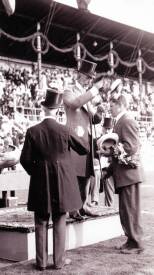| Olympia | Games | Events & athletes | Background | Impact |
In the second half of the nineteenth century, English gentlemen-athletes thought that one had to be an 'amateur' to take part in important contests. Originally this meant a difference in social class: upperclass sportsmen were 'amateurs', sportsmen from the working classes were 'professionals'. At the end of the century the definition was refined: an 'amateur' was someone who did not earn any money with his sport. Discussion continued about the exact definition: Can an amateur take part in contests in which also professionals participate? Can someone be an amateur in one sport and a professional in another? Is a sports teacher a professional? Can the sport club pay the travelling expenses of an athlete?
 Until the eighties only amateurs were allowed to participate in the Olympic games. A famous episode from Olympic history is the Thorpe case. James Thorpe was an American athlete who won both the pentathlon and the decathlon at the 1912 games of Stockholm. The Swedish king handed him the medal with the words: "You, Sir, are the greatest athlete in the world!" After the games it came out that Thorpe had earned money playing baseball as a student. Since he was no longer considered an amateur his medal was taken away from him. Only in 1982 the IOC came back on this decision and Thorpe was posthumously rehabilitated.
Until the eighties only amateurs were allowed to participate in the Olympic games. A famous episode from Olympic history is the Thorpe case. James Thorpe was an American athlete who won both the pentathlon and the decathlon at the 1912 games of Stockholm. The Swedish king handed him the medal with the words: "You, Sir, are the greatest athlete in the world!" After the games it came out that Thorpe had earned money playing baseball as a student. Since he was no longer considered an amateur his medal was taken away from him. Only in 1982 the IOC came back on this decision and Thorpe was posthumously rehabilitated.
The IOC justified its policy by referring to Antiquity: the Greek athletes were also amateurs and the only prize for an Olympic victory was an olive-crown. Several scholars, e.g. Mahaffy, Gardner and the very influential Gardiner, described the classical Greek athletes as true amateurs and considered the Hellenistic and Roman period, when professionalism came to the fore, as a period of decline, although athletics was being practiced more intensively than ever before. Being themselves great supporters of the modern amateurism, these authors applied their ideal to the ancient Greeks. Today historians no longer think that the Greek athletes were amateurs. Many athletes were indeed aristocrats, but they had no qualms in accepting prizes at the games or rewards at their home-coming.